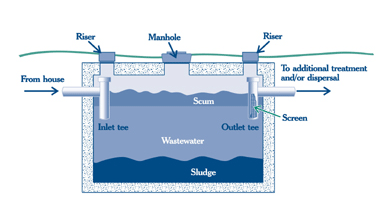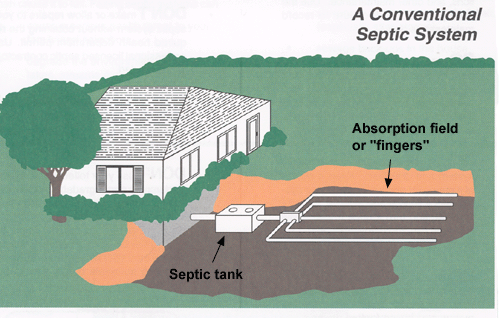What Is a Septic System and How
Does It Work?
In simple terms, a septic system is
a holding tank in which natural bacterial action decomposes
human waste products into environmentally acceptable
components.
 A septic system includes a septic tank,
distribution box, and a septic field (also called an
absorption field).In the septic tank, bacteria break down
waste products into water, gas, and undigested material. This
undigested material, sometimes referred to as sludge, is heavy
and sinks to the bottom of the septic tank. Lighter material
floats to the top of the septic tank. A septic system includes a septic tank,
distribution box, and a septic field (also called an
absorption field).In the septic tank, bacteria break down
waste products into water, gas, and undigested material. This
undigested material, sometimes referred to as sludge, is heavy
and sinks to the bottom of the septic tank. Lighter material
floats to the top of the septic tank.
Inside the septic tank, baffles keep the heavy
material at the bottom and the lighter material at the top
from floating out of the septic tank. The septic tank has a
vent system that allows gases produced in this process to be
released into the air. Liquids from the tank flow into
perforated pipes and then are metered out and absorbed into
the septic field. The soil in the septic field also helps to
filter out smaller solids present in the liquids. The heavy
particles (sludge) at the bottom of the septic tank must be
pumped out and disposed of every 2 years. 
All Septic Systems Eventually
Fail
Most septic systems will last about 25 to 30
years if they are properly maintained. However, all septic
systems will eventually fail. The following factors contribute
to and hasten the failure of septic systems:
-
Soil can clog the
system. If sludge escapes into the distribution box and
makes its way into the septic field, the soil in the field
will become clogged with sludge, and liquids will no longer
be absorbed into the soil. Not having the septic tank pumped
regularly can lead to these kinds of clogs and can cause the
septic system to fail.
-
Poor underlying soil conditions. If
the soil in the absorption field is not capable of absorbing
the liquids, the system can back up or puddles can develop
at the grade level.
-
High water tables. During abnormally
wet seasons, groundwater may rise into the septic field and
force sewage upward to the ground surface. If this occurs,
the system has to be re-installed at a higher
level.
-
Roots can clog the system. Tree roots
or plants can sometimes block the system. Removing the roots
and clearing the pipes usually will remedy this.
-
Physical damage. Vehicles or heavy
equipment passing over the system can cause damage to the
underground pipes and connections.
Septic System
Inspections
If you are purchasing a house with a
septic system, we strongly recommend that you have the
septic system professionally inspected. Replacement of a
failed septic system costs approximately $20,000 to $30,000.
Therefore, it is important to find out whether the septic
system has been maintained and is in good working order.
We recommend an open-pit septic inspection.
This type of inspection involves removing the septic tank
lid in order to inspect the septic tank baffles. During the
inspection, the drain fields will also be probed using a
long, heavy, metal rod to determine whether they are
functioning properly.
We can arrange for a professional open-pit
septic inspection to be performed at the time of your NJ
home inspection. Alternatively, you can contract
independently with any septic inspection company of your
choice.
| 



